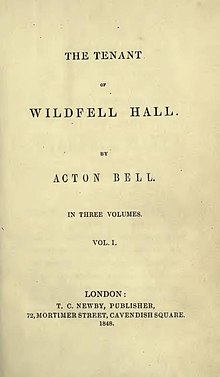The mistress of Wildfell Hall
The Mistress of Wildfell Hall (original title The Tenant of Wildfell Hall ) is a novel by Anne Brontë from the year 1848. It tells the story of the young Helen Lawrence who suffers so much from the antics and misconduct of her alcoholic and pleasure-addicted husband that she finally flees from him and settles in Wildfell Hall under an assumed name.
Today, The Lady of Wildfell Hall is considered to be one of the first feminist novels, a fact that is all the more understandable when you consider that until the passage of the Married Women's Property Act in 1870, married women were legally prohibited from owning property to file for divorce or obtain custody of their children.
content

There is great excitement in the Wildfell Hall neighborhood when a new tenant moves into the old house with her son. The young widow Helen Graham is rather cool and reserved about the friendly invitations from the village community, in places downright suspicious. In addition, she causes a stir with her ridiculously exaggerated care for her son in the eyes of the neighbors, as well as with her resolute views on men and upbringing.
The young farmer Gilbert Markham quickly realizes that Mrs. Graham has secrets. Despite her reticence and reserve, he falls in love with the pretty widow and stubbornly tries to win her over. Although Mrs. Graham is very reluctant, Markham gradually makes progress and gradually manages to gain her affection. During one of his visits, he overheard a conversation between her and the owner of the estate, Frederick Lawrence. Markham, who has always vigorously denied the persistent rumors in the village about an affair between Mrs. Graham and Mr. Lawrence and stood up for the integrity of the lady, misinterprets what he has seen and heard. Out of anger, he later beats Frederick Lawrence, for whom he actually feels respect, and injures him. Mrs. Graham then gives him her diary to read so that Markham can see what happened to her before she came to Wildfell.
Markham learns that Helen Graham's real name is Helen Huntingdon and that she is married to a cruel and alcoholic man. She married Arthur Huntingdon years ago out of love and against her aunt's advice, believing that she could help him get better. Years later, under his loveless treatment, her love is extinguished and she decides to leave him to protect herself and her son from his father's bad example. With the help of Mr Lawrence - who is her brother - she is now hiding in Wildfell under her mother's maiden name.
Things take an unexpected turn for Markham when Helen returns to Huntingdon. As a result of his antics, he is now terminally ill, and Helen still feels obliged to stand by him as best she can. She tends to Huntingdon until his death. After his death, her son inherits the property that she manages for him. Since Helen's uncle dies in addition and leaves her all his fortune, she is suddenly a rich heiress. Markham still loves her, but the sudden difference in status between him and her and the fact that he has only heard from her through her brother since she left Wildfell prevent him from reaching out to her. He is also aware that a period of mourning must be observed so soon after the deaths. Only when he learns that Helen is supposed to be getting married does he travel to see her to see for himself. The message turns out to be false. When Markham finally asks for her hand, Helen happily accepts.
Film adaptations
- 1968 - The Tenant of Wildfell Hall - BBC mini series. Directed by Peter Sasdy , with Janet Munro , Corin Redgrave and Bryan Marshall .
- 1996 - The Lady of Wildfell Hall - BBC miniseries. Directed by Mike Barker, with Toby Stephens , Tara Fitzgerald and Rupert Graves .
Web links
- Anne Brontë: The Tenant of Wildfell Hall. (E-book)
- Anne Brontë: The Mistress of Wildfell Hall (E-Book)
Individual evidence
- ^ Stevie Davies: Introduction and Notes . In: The Tenant of Wildfell Hall . Penguin Books, 1996, ISBN 978-0-14-043474-3 .
- ↑ The Lady of Wildfell Hall - BBC Mini-Series

